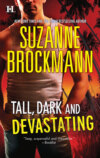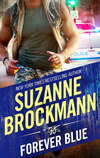Читать книгу: «Tall, Dark and Devastating», страница 7
“No,” she said evenly. “He told me because I asked him if he knew what had caused the great big bug to crawl up your pants.”
She pushed herself forward to catch a wave before it broke and bodysurfed to shore like a professional—as if she’d been doing it all of her life.
She’d asked Joe. Harvard followed her out of the water feeling foolishly pleased. “It’s no big deal—the fact that they’re moving, I mean. I’m just being a baby about it.”
P.J. sat in the sand, leaned back against her elbows and stretched her legs out in front of her. “Your parents lived in the same house for, what? Thirty years?”
“Just about.” Harvard sat next to her. He stared at the ocean in an attempt to keep from staring at her legs. Damn, she had nice legs. It was impossible not to look, but he told himself that was okay, because he was making damn sure he didn’t touch. Still, he wanted to.
“You’re not being a baby. It is a big deal,” she told him. “You’re allowed to have it be a big deal, you know.”
He met her eyes, and she nodded. “You are allowed,” she said again.
She was so serious. She looked as if she were prepared to go into mortal combat over the fact that he had the right to feel confused and upset over his parents’ move. He felt his mouth start to curve into a smile, and she smiled, too. The connection between them sparked and jumped into high gear. Damn. When they had sex, it was going to be great. It was going to be beyond great.
But it wasn’t going to be today. If he were smart he’d rein in those wayward thoughts, keep himself from getting too overheated.
“It’s just so stupid,” he admitted. “But I’ve started having these dreams where suddenly I’m ten years old again, and I’m walking home from school and I get home and the front door’s locked. So I ring the bell and this strange lady comes to the screen. She tells me my family has moved, but she doesn’t know where. And she won’t let me in, and I just feel so lost, as if everything I’ve ever counted on is gone and… It’s stupid,” he said again. “I haven’t actually lived in that house for years. And I know where my parents are going. I have the address. I already have their new phone number. I don’t know why this whole thing should freak me out this way.”
He lay back in the sand, staring at the hazy sky.
“This opportunity is going to be so good for my father,” he continued. “I just wish I could have taken the time to go up there, help them out with the logistics.”
“Where exactly are they moving?” P.J. asked.
“Phoenix, Arizona.”
“No ocean view there.”
He turned to face her, propping his head on one hand. “That shouldn’t matter. I’m the one who liked the ocean view, and I don’t live with them anymore.”
“Where do you live?” she asked.
Harvard couldn’t answer that without consideration. “I have a furnished apartment here in Virginia.”
“That’s just temporary housing. Where do you keep your stuff?”
“What stuff?”
“Your bed. Your kitchen table. Your stamp collection. I don’t know, your stuff.”
He lay down, shaking his head. “I don’t have a bed or a kitchen table. And I used the last stamp I bought to send a letter to my little sister at Boston University.”
“How about your books?” P.J. ventured. “Where do you keep your books?”
“In a climate-controlled self-storage unit in Coronado, California.” He laughed and closed his eyes. “Damn, I’m pathetic, aren’t I? Maybe I should get a sign for the door saying Home Sweet Home.”
“Are you sure you ever really moved out of your parents’ house?” she asked.
“Maybe not,” he admitted, his eyes still closed. “But if that’s the case, I guess I’m moving out today, huh?”
P.J. hugged her legs to her chest as she sat on the beach next to the Alpha Squad’s Senior Chief.
“Maybe that’s why I feel so bad,” he mused. “It’s a symbolic end to my childhood.” He glanced at her, amusement lighting his eyes. “Which I suppose had to happen sooner or later, considering that in four years I’ll be forty.”
Harvard Becker was an incredibly beautiful-looking man. His body couldn’t have been more perfect if some artisan had taken a chisel to stone and sculpted it. But it was his eyes that continued to keep P.J. up at night. So much was hidden in their liquid brown depths.
It had been a bold move on her part to suggest they go off alone to walk. With anyone else, she wouldn’t have thought twice about it. But with everyone else, the boundaries of friendship weren’t so hard to define.
When it came to this man, P.J. was tempted to break her own rules. And that was a brand-new feeling for her. A dangerous feeling. She hugged her knees a little tighter.
“There was a lot wrong with that house in Hingham,” Harvard told her. “The roof leaked in the kitchen. No matter how many times we tried to fix it, as soon as it stormed, we’d need to get out that old bucket and put it under that drip. The pipes rattled, and the windows were drafty, and my sisters were always tying up the telephone. My mother’s solution to any problem was to serve up a hearty meal, and my old man was so immersed in Shakespeare most of the time he didn’t know which century it was.”
He was trying to make jokes, trying to bring himself out of the funk he’d been in, trying to pretend it didn’t matter.
“I couldn’t wait to move out, you know, to go away to school,” he said.
He was trying to make it hurt less by belittling his memories. And there was no way she was going to sit by and listen quietly while he did that.
“You know that dream you’ve been having?” she asked. “The one where you get home from school and your parents are gone?”
He nodded.
“Well, it didn’t happen to me exactly like that,” she told him. “But one day I came home from school and I found all our furniture out on the sidewalk. We’d been evicted, and my mother was gone. She’d vanished. She’d dealt with the bad news not by trying to hustle down a new apartment, but by going out on a binge.”
He pushed himself into a sitting position. “My God…”
“I was twelve years old,” P.J. said. “My grandmother had died about three months before that, and it was just me and Cheri—my mom. I don’t know what Cheri did with the rent money, but I can certainly guess. I remember that day like it was yesterday. I had to beg our neighbors to hold on to some of that furniture for us—the stuff that wasn’t already broken or stolen. I had to pick and choose which of the clothing we could take and which we’d have to leave behind. I couldn’t carry any of my books or toys or stuffed animals, and no one had any room to store a box of my old junk, so I put ’em in an alley, hoping they’d still be there by the time I found us another place to live.” She shot him a look. “It rained that night, and I never even bothered to go back. I knew the things in that box were ruined. I guess I figured I didn’t have much use for toys anymore, anyway.”
She took a deep breath. “But that afternoon, I loaded up all that I could carry of our clothes in shopping bags and I went looking for my mother. You see, I needed to find her in order to get a bed in the shelter that night. If I tried to go on my own, I’d be taken in and made a ward of the state. And as bad as things were with Cheri, I was afraid that would be even worse.”
Harvard swore softly.
“I’m not giving you the 411 to make you feel worse.” She held his gaze, hoping he would understand. “I’m just trying to show you how really lucky you were, Daryl. How lucky you are. Your past is solid. You should celebrate it and let it make you stronger.”
“Your mother…”
“Was an addict since before I can remember,” P.J. told him flatly. “And don’t even ask about my father. I’m not sure my mother knew who he was. Cheri was fourteen when she had me. And her mother was sixteen when she had her. I did the math and figured out if I followed in my family’s hallowed tradition, I’d be nursing a baby of my own by the time I was twelve. That’s the childhood I climbed out of. I escaped, but just barely.” She raised her chin. “But if there’s one thing I got from Cheri, it’s a solid grounding in reality. I am where I am today because I looked around and I said no way. So in a sense, I celebrate my past, too. But the party in my head’s not quite as joyful as the one you should be having.”
“Damn,” Harvard said. “Compared to you, I grew up in paradise.” He swore. “Now I really feel like some kind of pouting child.”
P.J. looked at the ocean stretching all the way to the horizon. She loved knowing that it kept going and going and going, way past the point where the earth curved and she couldn’t see it anymore.
“I’ve begun to think of you as a friend,” she told Harvard. She turned to look at him, gazing directly into his eyes. “So I have to warn you—I only have guilt-free friendships. You can’t take anything I’ve told you and use it to invalidate your own bad stuff. I mean, everyone’s got their own luggage, right? And friends shouldn’t set their personal suitcase down next to someone else’s, size them both up and say, hey, mine’s not as big as yours, or hey, mine’s bigger and fancier so yours doesn’t count.” She smiled. “I’ll tell you right now, Senior Chief, I travel with an old refrigerator box, and it’s packed solid. Just don’t knock it over, and I’ll be all right. Yours, on the other hand, is very classy Masonite. But your parents’ move made the lock break, and now you’ve got to tidy everything up before you can get it fixed and sealed up tight again.”
Harvard nodded, smiling at her. “That’s a very poetic way of telling me don’t bother to stage a pissing contest, ’cause you’d win, hands down.”
“That’s right. But I’m also telling you don’t jam yourself up because you feel sad about your parents leaving your hometown,” P.J. said. “It makes perfect sense that you’ll miss that house you grew up in—that house you’ve gone home to for the past thirty years. There’s nothing wrong with feeling sad about that. But I’m also saying that even though you feel sad, you should also feel happy. Just think—you’ve had that place to call home and those people to make it a good, happy home for all these years. You’ve got memories, good memories you’ll always be able to look back on and take comfort from. You know what having a home means, while most of the rest of the people in the world are just floating around, upside down, not even knowing what they’re missing but missing it just the same.”
He was silent, so she kept going. She couldn’t remember the last time she’d talked so much. But this man, this new friend with the whiskey-colored eyes, who made her feel like cheating the rules—he was worth the effort.
“You can choose to have a house and a family someday, kids, the whole nine yards, like your parents did,” she told him. “Or you can hang on to those memories you carry in your heart. That way, you can go back to that home you had, wherever you are, whenever you want.”
There. She’d said everything she wanted to say to him. But he was so quiet, she began to wonder if she’d gone too far. She was the queen of dysfunctional families. What did she know about normal? What right did she have to tell him her view of the world with such authority in her voice?
He cleared his throat. “So where do you live now, P.J.?”
She liked it when Harvard called her P.J. instead of Richards. It shouldn’t have mattered, but it did. She liked the chill she got up her spine from the heat she could sometimes see simmering in his eyes. And she especially liked knowing he respected her enough to hold back. He wanted her. His attraction was powerful, but he respected her enough to not keep hammering her with come-on lines and thinly veiled innuendos. Yeah, she liked that a lot.
“I have an apartment in D.C., but I’m hardly ever there.” She picked up a handful of sand and let it sift through her fingers. “See, I’m one of the floaters. I still haven’t unpacked most of my boxes from college. I haven’t even bought furniture for the place, although I do have a bed and a kitchen table.” She shot him a rueful smile. “I don’t need extensive therapy to know that my nesting instincts are busted, big-time. I figure it’s a holdover from when I was a kid. I learned not to get attached to any one place because sooner or later the landlord would be kicking us out and we’d be living somewhere else.”
“If you could live anywhere in the world,” he asked, “where would you live?”
“Doesn’t matter where, as long as it’s not in the middle of a city,” P.J. answered without hesitation. “Some cute little house with a little yard—doesn’t have to be big. It just has to have some land. Enough for a flower garden. I’ve never lived anywhere long enough to let a garden grow,” she added wistfully.
Harvard was struck by the picture she made sitting there. She’d just run eight miles at a speed that had his men cursing, then walked three miles more. She was sandy, she was sticky from salt and sweat, her hair was less than perfect, her makeup long since gone. She was tough, she was driven, she was used to not just getting by but getting ahead in a man’s world, and despite all that, she was sweetly sentimental as all get out.
She turned to meet his gaze, and as if she could somehow read his mind, she laughed. “God, I sound like a sap.” Her eyes narrowed. “If you tell anyone what I said, you’re a dead man.”
“What, that you like flowers? Since when is that late-breaking piece of news something you need to keep hidden from the world?”
Something shifted in her eyes. “You can like flowers,” she told him. “You can read Jane Austen in the mess hall at lunch. You can drink iced tea instead of whiskey shots with beer chasers. You can do what you want. But if I’m caught acting like a woman, if I wear soft, lacy underwear instead of the kind made from fifty percent cotton and fifty percent sandpaper, I get looked at funny. People start to wonder if I’m capable of doing my job.”
Harvard tried to make her smile. “Personally, I stay away from the lacy underwear myself.”
“Yeah, but you could wear silk boxers, and your men would think, ‘Gee, the Senior Chief is really cool.’ I wear silk, and those same men start thinking with a nonbrain part of their anatomy.”
“That’s human nature,” he argued. “That’s because you’re a beautiful woman and—”
“You know, it always comes down to sex,” P.J. told him crossly. “Always. You can’t put men and women in a room together without something happening. And I’m not saying it’s entirely the men’s fault, although men can be total dogs. Do you know that I had to start fighting off my mother’s boyfriends back when I was ten? Ten. They’d come over, get high with her, and then when she passed out, they’d start sniffing around my bedroom door. My grandmother was alive then, and she’d give ’em a piece of her mind, chase ’em out of the house. But after she died, when I was twelve, I was on my own. I grew up fast, I’ll tell you that much.”
When Harvard was twelve, he’d had a paper route. The toughest thing he’d had to deal with was getting up early every morning to deliver those papers. And the Doberman on the corner of Parker and Reingold. That mean old dog had been a problem for about a week or two. But in time, Harvard had gotten used to the early mornings, and he’d made friends with the Doberman.
Somehow he doubted P.J. had had equally easy solutions to her problems.
She gazed at the ocean, the wind moving a stray curl across her face. She didn’t seem to feel it, or if she did, she didn’t care enough to push it away.
He tried to picture her at twelve years old. She must’ve been tiny. Hell, she was tiny now. It wouldn’t have taken much of a man to overpower her and—
The thought made him sick. But he had to know. He had to ask. “Did you ever… Did they ever…”
She turned to look at him, and he couldn’t find any immediate answers in the bottomless darkness of her eyes.
“There was one,” she said softly, staring at the ocean. “He didn’t back off when I threatened to call my uncle. Of course, I didn’t really have any uncle. It’s possible he knew that. Or maybe he was just too stoned to care. I had to go out the window to get away from him—only in my panic, I went out the wrong window. I went out the one without the fire escape. Once I was out there, I couldn’t go back. I went onto the ledge and I just stood there, sixteen stories up, scared out of my mind, staring at those little toy cars on the street, knowing if I slipped, I’d be dead, but certain if I went back inside I’d be as good as dead.” She looked at Harvard. “I honestly think I would’ve jumped before I would’ve let him touch me.”
Harvard believed her. This man, whoever he’d been, may not have hurt P.J. physically, but he’d done one hell of a job on her emotionally and psychologically.
He had to clear his throat before he could speak. “I don’t suppose you remember this son of a bitch’s name?” he asked.
“Ron something. I don’t think I ever knew his last name.”
He nodded. “Too bad.”
“Why?”
Harvard shrugged. “Nothing important. I was just thinking it might make me feel a little better to hunt him down and kick the hell out of him.”
P.J. laughed—a shaky burst of air that was part humor and part surprise. “But he didn’t hurt me, Daryl. I took care of myself and…I was okay.”
“Were you?” Harvard reached out for her. He knew he shouldn’t. He knew that just touching her lightly under the chin to turn her to face him would be too much. He knew her skin would be sinfully soft beneath his fingers, and he knew that once he touched her, he wouldn’t want to let go. But he wanted to look into her eyes, so he did. “Tell me this—are you still afraid of heights?”
She didn’t need to answer. He saw the shock of the truth in her eyes before she pulled away. She stood up, moved toward the water, stopping on the edge of the beach, letting the waves wash over her feet.
Harvard followed, waiting for her to look at him again.
P.J.’s head was spinning. Afraid of heights? Terrified was more like it.
She couldn’t believe he’d figured that out. She couldn’t believe she’d told him enough to give herself away. Steeling herself, she looked at him. “I can handle heights, Senior Chief. It’s not a problem.”
She could tell from the look on his face he didn’t believe her.
“It’s not a problem,” she said again.
Damn. She’d told him too much.
It was one thing to joke around about her dream house. But telling him about her problem with heights was going way too far.
It would do her absolutely no good to let this man know her weaknesses. She had to have absolutely no vulnerabilities to coexist in his macho world. She could not be afraid of heights. She would not be. She could handle it—but not if he made it into an issue.
P.J. rinsed her hands in the ocean. “We better get back if we want to have any lunch.”
But Harvard blocked the way to where her sneakers and T-shirt were lying on the sand. “Thanks for taking the time to talk to me,” he said.
She nodded, still afraid to meet his eyes. “Yeah, I’m glad we’re friends.”
“It’s nice to be able to talk to someone in confidence—and know you don’t have to worry about other people finding out all your deep, dark secrets,” Harvard told her.
P.J. did look at him then, but he’d already turned away.
CHAPTER EIGHT
“MAN, IT’S QUIET AROUND HERE TODAY,” Harvard said as he came into the decaying Quonset hut that housed Alpha Squad’s office.
Lucky was the only one around, and he looked up from one of the computers. “Hey, H.,” he said with a cheerful smile. “Where’ve you been?”
“There was a meeting with the base commander that I absolutely couldn’t miss.” Harvard rolled his eyes. “It was vital that I go with the captain to listen to more complaints about having the squad temporarily stationed here. This base is regular Navy, and SEALs don’t follow rules. We don’t salute enough. We drive too fast. We make too much noise at the firing range. We don’t cut our hair.” He slid his hand over his cleanly shaved head. “Or we cut our hair too short. I tell you, there’s no pleasing some folks. Every week it’s the same, and every week we sit there, and I take notes, and the captain nods seriously and explains that the noise at the firing range occurs when we discharge our weapons and he’s sorry for the inconvenience, but one of the reasons Alpha Squad has the success record it does is that each and every one of us takes target practice each day, every day, and that’s not going to change. And then the supply officer steps forward and informs us that the next time we want another box of pencils, we’ve got to get ’em from Office Max. We appear to have used up our allotted supply.” He shook his head. “We got lectured on that for ten minutes.”
“Ten minutes? On pencils?”
Harvard grinned. “That’s right.” He turned toward his office. “Joe’s right behind me. He should be back soon—unless he gets cornered into sticking around for lunch.”
Lucky made a face. “Poor Cat.”
“This is what you have to look forward to, O’Donlon,” Harvard said with another grin. “It’s only a matter of time before you make an oh-six pay grade and get your own command. And then you’ll be rationing pencils, too.” He laughed “It’s not just a job—it’s an adventure.”
“Gee, thanks, H. I’m all aquiver with anticipation.”
Harvard pushed open his office door. “Do me a favor and dial the captain’s pager number. Give him an emergency code. Let’s get him out of there.”
Lucky picked up the phone and quickly punched in a series of numbers. He dropped the receiver into the cradle with a clatter.
“So where’s everyone this afternoon?” Harvard called as he took off his jacket and hung it over the chair at his desk. “I stopped by the classroom on my way over, but it was empty. They’re not all still at lunch, are they?”
“No, they’re at the airfield. I’m heading over there myself in about ten minutes.” Lucky raised his voice to be heard through the open door.
Harvard stopped rifling through the files on his desk. “They’re where?”
“At the field. It’s jump day,” Lucky told him.
“Today?” Harvard moved to the door to stare at the younger SEAL. “No way. That wasn’t scheduled until next week.”
“Yeah, everything got shifted around, remember? We had to move the jump up a full week.”
Harvard shook his head. “No. No, I don’t remember that.”
Lucky swore. “It must’ve been the day you went to Boston. Yeah, I remember you weren’t around, so Wes took care of it. He said he wrote a memo about it. He said he left it on your desk.”
Harvard’s desk was piled high with files and papers, but he knew exactly what was in each file and where each file was in each pile. It may have looked disorganized, but it wasn’t. He’d cleared his In basket at least ten times since he’d taken that day of personal leave. He’d caught up on everything he’d missed. There was no memo from Wesley Skelly on that desk.
Or was there?
Underneath the coffee mug with a broken handle that held his pens and some of those very pencils the base supply officer had been in a snit about, Harvard could see a flash of yellow paper. He lifted the mug and turned the scrap of paper over.
This was it.
Wes had written an official memo on the inside of an M&M’s wrapper. It was documentation of the rescheduled jump date, scribbled in barely legible pencil.
“I’m going to kill him,” Harvard said calmly. “I’m going to find him, and I’m going to kill him.”
“You don’t have to look far to find him,” Lucky said. “He’s with the finks in the classroom at the main hangar. He’s helping Blue teach ’em the basics of skydiving.”
Harvard shook his head. “If I’d known the jump was today, I would’ve made arrangements to skip this morning’s meeting. I wanted to be here to make it clear to the finks that participating in this exercise is optional.” He looked sharply at O’Donlon. “Were you there when Blue gave his speech? Do they understand they don’t have to do this?”
Lucky shrugged. “Yeah. They’re all up for it, though. It’s no big deal.”
But it was a big deal. Harvard knew that for P.J. it had to be a very, very big deal.
When he’d figured out yesterday that she was afraid of heights, he’d known about the skydiving jump, but he’d thought it was a week away. If he’d known otherwise, he would’ve warned her then and there. He could’ve told her that choosing not to participate didn’t matter one bit in the big picture.
The purpose of the exercise was not to teach the finks to be expert skydivers. There was no way they could do that with only one day and only one jump. When they’d set up the program, the captain had thought a lesson in skydiving would give the agents perspective on the kind of skills the SEALs needed to succeed as a counterterrorist team.
It was supposed to underscore the message of the entire program—let the SEALs do what they do best without outside interference.
Harvard looked at his watch. It was just past noon. “O’Donlon, is the jump still scheduled for thirteen-thirty?”
“It is,” Lucky told him. “I’m going over to help out. You know me, I never turn down an opportunity to jump.”
Harvard took a deep breath. More than an hour. Good. He still had time. He could relax and take this calmly. He could change out of this blasted dress uniform instead of screaming over to the airfield in a panic.
The phone rang. It had to be Joe Cat, answering his page.
Harvard picked it up. “Rescue squad.”
Joe covered a laugh by coughing. “Sit rep, please.” The captain was using his officer’s voice, and Harvard knew that wherever he was, he wasn’t alone.
“We’re having a severe pencil shortage, Captain,” Harvard said rapidly, in his best imitation of a battle-stressed officer straight from Hollywood’s Central Casting. “I think you better get down here right away to take care of it.”
Joe coughed again, longer and louder this time. “I see.”
“So sorry to interrupt your lunch, sir, but the men are in tears. I’m sure the commander will understand.”
Joe’s voice sounded strangled. “I appreciate your calling.”
“Of course, if you’d prefer to stay and dine with the—”
“No, no. No, I’m on my way. Thank you very much, Senior Chief.”
“I love you, too, Captain,” Harvard said and hung up the phone.
Lucky was on the floor, laughing. Harvard nudged him with his toe and spoke in his regular voice. “I’m changing out of this ice-cream suit. Don’t you dare leave for the airfield without me.”
The half of a chicken-salad sandwich P.J. had forced down during lunch was rolling in her stomach.
Lieutenant Blue McCoy stood in front of the group of SEALs and FInCOM agents, briefing them on the afternoon’s exercise.
P.J. tried to pay attention as he recited the name of the aircraft that would take them to an altitude from which they’d jump out of the plane.
Jump out of the plane.
P.J. took a deep breath. She could do this. She knew she could do this. She was going to hate it, but just like going to the dentist, time would keep ticking, and the entire ordeal would eventually be over and done with.
“We’ll be going out of the aircraft in teams of two,” Blue said in his thick Southern drawl. “You will stay with your jump buddy for the course of the exercise. If you become separated during landing, you must find each other immediately upon disposing of your chute. Remember, we’ll be timing you from the moment you step out of that plane to the moment you check in at the assigned extraction point. If you reach the extraction point without your partner, you’re automatically disqualified. Does everyone understand?”
P.J. nodded. Her mouth was too dry to murmur a reply.
The door opened at the back of the room, and Blue paused and smiled a greeting. “About time you boys got here.”
P.J. turned to see Harvard closing the door behind him. He was wearing camouflage pants tucked securely into black boots and a snugly fitting dark green T-shirt. He was looking directly at her from under the brim of his cap. He nodded just once, then turned his attention to McCoy.
“Sorry to interrupt,” he said. It wasn’t until he moved toward the front of the room that P.J. noticed Lucky had been standing beside him. “Have you worked up the teams yet, Lieutenant?”
Blue nodded. “I have the list right here, Senior Chief.”
“Mind doing some quick revising so I can get in on the action?”
“’Course not,” Blue replied. He looked at the room. “Why don’t y’all take a five-minute break?”
P.J. wasn’t the only one in the room who was nervous. Greg Greene went to the men’s room for the fourth time in half an hour. The other men stood and stretched their legs. She sat there, wishing she could close her eyes and go to sleep, wishing that when she woke up it would be tomorrow morning and this day would be behind her, most of all wishing Harvard had given her some kind of warning that today’s challenge would involve jumping out of an airplane thousands of feet above the earth.
As she watched, Harvard leaned against the table to look at the list. He supported himself with his arms, and his muscles stood out in sharp relief. For once, she let herself look at him, hoping for a little distraction.
The man was sheer perfection. And speaking of distractions, his shirt wasn’t the only thing that fit him snugly. His camouflage pants hugged the curve of his rear end sinfully well. Why on earth anyone would want to camouflage that piece of art was beyond her.
He was deep in discussion with Blue, then both men paused to glance at her, and she quickly looked away. What was Harvard telling the lieutenant? It was clear they were talking about her. Was Harvard telling McCoy all she’d let slip yesterday at the beach? Were they considering the possibility that she might freeze with fear and end up putting more than just herself in danger? Were they going to refuse to let her make the jump?
Бесплатный фрагмент закончился.
Начислим
+18
Покупайте книги и получайте бонусы в Литрес, Читай-городе и Буквоеде.
Участвовать в бонусной программе




























